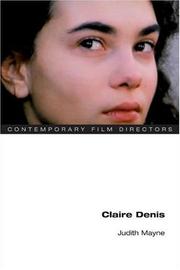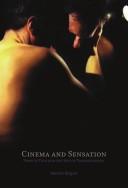| Listing 1 - 5 of 5 |
Sort by
|

ISBN: 0252072383 1461958407 0252096398 9781461958406 9780252096396 0252029917 9780252029912 9780252072383 Year: 2005 Publisher: Urbana : University of Illinois Press,
Abstract | Keywords | Export | Availability | Bookmark
 Loading...
Loading...Choose an application
- Reference Manager
- EndNote
- RefWorks (Direct export to RefWorks)
791.471 DENIS --- Denis Claire --- film --- filmregisseurs --- Frankrijk --- twintigste eeuw --- Denis, Claire --- Criticism and interpretation. --- Denis, Claire,
Book
ISBN: 9781474403283 9781474403276 9781474409520 147440328X 1474409520 Year: 2016 Publisher: Edinburgh : Edinburgh University Press,
Abstract | Keywords | Export | Availability | Bookmark
 Loading...
Loading...Choose an application
- Reference Manager
- EndNote
- RefWorks (Direct export to RefWorks)
Develops an account of non-normative feminist cinematic ethics and a fresh methodological approach to film-philosophy.
Professional ethics. Deontology --- Film --- Denis, Claire --- Levinas, Emmanuel --- Nancy, Jean-Luc --- Motion pictures --- Feminist ethics. --- Moral and ethical aspects. --- Denis, Claire, --- Lévinas, Emmanuel --- Criticism and interpretation.
Book
ISBN: 147440328X 1474409520 9781474403283 1474403271 9781474403276 9781474409520 Year: 2016 Publisher: Edinburgh : Edinburgh University Press,
Abstract | Keywords | Export | Availability | Bookmark
 Loading...
Loading...Choose an application
- Reference Manager
- EndNote
- RefWorks (Direct export to RefWorks)
Develops an account of non-normative feminist cinematic ethics and a fresh methodological approach to film-philosophy.
Motion pictures --- Feminist ethics. --- Moral and ethical aspects. --- Denis, Claire, --- Lévinas, Emmanuel --- Nancy, Jean-Luc --- Criticism and interpretation. --- Ethics --- Feminism --- Moral and ethical aspects --- Lévinas, E. --- Leṿinas, ʻImanuʼel --- Levinas, Emani︠u︡el --- לוינס׳ עמנואל --- לוינס, עמנואל --- Līfīnās, Īmānwāl --- ليفيناس، إيمانوال --- Professional ethics. Deontology --- Film --- Denis, Claire --- Levinas, Emmanuel --- Lévinas, Emmanuel --- Nancy, Jean-Luc. --- Levinas, Emmanuel.

ISBN: 9780748649365 0748649360 9780748620425 9780748629176 0748629173 1281251968 9781281251961 0748620427 9786611251963 6611251960 074867084X Year: 2007 Publisher: Edinburgh : Edinburgh University Press,
Abstract | Keywords | Export | Availability | Bookmark
 Loading...
Loading...Choose an application
- Reference Manager
- EndNote
- RefWorks (Direct export to RefWorks)
This book looks at a much-debated phenomenon in contemporary cinema: the re-emergence of filmmaking practices (and, by extension, of theoretical approaches) that give precedence to cinema as the medium of the senses. France offers an intriguing case in point here. A specific sense of momentum comes from the release, in close succession, of a series of films that exemplify a characteristic awareness of cinema's sensory impact and transgressive nature: Adieu; A ma soeur; Baise-moi; Beau Travail; La Blessure; La Captive; Dans ma peau; Demonlover; L'Humanité; Flandres; L'Intrus; Les Invisibles; Lady Chatterley; Leçons de ténèbres; Romance; Sombre; Tiresia; Trouble Every Day; Twentynine Palms; Vendredi soir; La Vie nouvelle; Wild Side; Zidane, un portrait du XXIème siècle. These films, amongst others, typify a willingness to explore cinema's unique capacity to move us both viscerally and intellectually. Martine Beugnet focuses on the crucial and fertile overlaps that occur between experimental and mainstream cinema. Her book draws on the writings of the likes of Deleuze, Merleau-Ponty and Bataille, but first and foremost, she develops her arguments from the films themselves, from the comprehensive description of specific sequences, techniques and motifs which allows us to engage with the works as material events and as thinking processes. In turn, she demonstrates how the films, envisaged as forms of embodied thought, offer alternative ways of approaching those questions that are at the heart of today's most burning socio-cultural debates: from the growing supremacy of technology, to globalisation, exile and exclusion, these are the issues that appear embedded here in the very texture of images and sounds.
film --- filmtheorie --- sensoriële cinema --- zintuiglijkheid --- eenentwintigste eeuw --- twintigste eeuw --- Grandrieux Philippe --- Dieutre Vincent --- Denis Claire --- Resnais Alain --- Assayas Olivier --- Bonello Bertrand --- Carax Leo --- Lifschitz Sébastien --- Akerman Chantal --- Frankrijk --- filmgeschiedenis --- 791.41 --- Senses and sensation in motion pictures. --- Human body in motion pictures. --- Motion pictures --- Body, Human, in motion pictures
Book
ISBN: 9780199993161 9780199993154 9780199993185 9780199993178 0199993165 0199993157 0199346380 0199993181 0199993173 9780199346387 Year: 2013 Publisher: New York, N.Y. Oxford University Press
Abstract | Keywords | Export | Availability | Bookmark
 Loading...
Loading...Choose an application
- Reference Manager
- EndNote
- RefWorks (Direct export to RefWorks)
The Desiring-Image yields new models of queer cinema produced since the late 1980s, based on close formal analysis of diverse films as well as innovative contributions to current film theory. The book defines "queer cinema" less as a specific genre or in terms of gay and lesbian identity, but more broadly as a kind of filmmaking that conveys sexual desire and orientation as potentially fluid within any individual's experience, and as forces that can therefore unite unlikely groups of people along new lines, socially, sexually, or politically. The films driving this analysis range from celebrated fixtures of the New Queer Cinema of the 1990s (including Cheryl Dunye's The Watermelon Woman and Todd Haynes's Velvet Goldmine) to sexually provocative films of the same era that are rarely classified as queer (David Cronenberg's Dead Ringers and Naked Lunch) to breakout films by 21st-century directors (Rodney Evans's Brother to Brother, John Cameron Mitchell's Shortbus). To frame these readings and to avoid heterosexist assumptions in other forms of film analysis, The Desiring-Image revisits the work of the philosopher Gilles Deleuze, whose two major works on cinema somehow never address the radical ideas about desire he expresses in other texts. This book brings those notions together in innovative ways, making them clear and accessible to newcomers and field specialists alike, with clear, illustrated examples drawn from a wide range of movies extending beyond the central case studies. Thus, The Desiring-Image speaks to readers interested in queer and gay/lesbian studies, in film theory, in feminist and sexuality scholarship, and in theory and philosophy, putting those discourses into rich, surprising conversations with popular cinema of the last 30 years.
Sociology of the family. Sociology of sexuality --- Philosophy and psychology of culture --- Film --- Deleuze, Gilles --- Homosexuality in motion pictures. --- Gays in motion pictures. --- Homosexualité au cinéma --- Homosexuels au cinéma --- Deleuze, Gilles, --- Criticism and interpretation. --- film --- twintigste eeuw --- eenentwintigste eeuw --- filmtheorie --- Deleuze Gilles --- homoseksualiteit --- gender studies --- film en homoseksualiteit --- Cronenberg David --- Mitchell John Cameron --- Dunye Cheryl --- Evans Rodney --- Denis Claire --- Haynes Todd --- 791.43 --- 791.41 --- Homosexualité au cinéma --- Homosexuels au cinéma --- Gays in motion pictures --- Homosexuality in motion pictures --- Motion pictures --- Deleuze, G. --- Delëz, Zhilʹ, --- Dūlūz, Jīl, --- دولوز، جيل --- Delezi, Jier, --- Gay people in motion pictures.
| Listing 1 - 5 of 5 |
Sort by
|

 Search
Search Feedback
Feedback About UniCat
About UniCat  Help
Help News
News